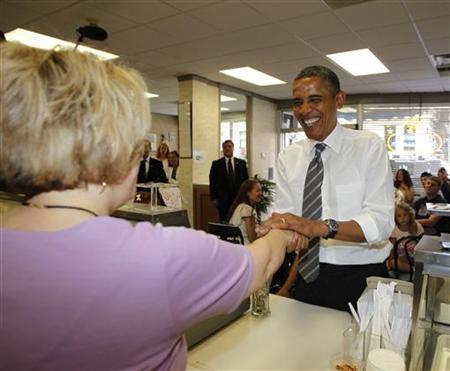(Reuters) – President Barack Obama on Wednesday ordered a series of modest steps aimed at helping small businesses, his latest election-year effort to counter Republican attacks on his economic record and show voters he is trying to tackle high unemployment.

The initiatives call for accelerating federal payments to government contractors, streamlining paperwork, and making it easier for small firms to get access to loans and tax credits, the White House said.
This follows Obama’s call for a one-year extension of Bush-era tax cuts for families earning less than $250,000, part of a re-election strategy to cast himself as a champion of the middle class and the Republicans as the party that favors the rich.
But Republicans – who argue that tax cuts should be maintained for everyone, including high earners – say letting taxes rise for wealthier Americans will punish many small businesses and discourage them from creating jobs.
Obama was due to discuss his proposed incentives for small-business growth and hiring as part of a broader meeting with Democratic congressional leaders at the White House on Wednesday, the White House said.
Republicans have accused Obama of trying to divert attention from his economic stewardship – considered the top issue on which his re-election hinges – after government data last week showed another month of weak job growth.
The small initiatives on Wednesday reflected election-year gridlock in Congress that has stalled much of Obama’s legislative agenda.
“The White House has so little to offer small businesses they’ve resorted to recycling, reusing, and repackaging,” said Brendan Buck, spokesman for Republican House of Representatives Speaker John Boehner. “This is no solace for small businesses facing a huge tax increase next year under the President’s plan.”
The measures are as follows:
* Obama is directing government agencies to pay their bills on an accelerated timeline to all prime contractors for the next year – within 15 days as opposed to 30 days.
* He is calling on Congress to let small businesses write off up to $250,000 in capital investments in 2013.
* The Small Business Administration is revamping its Small Loan Advantage program to raise the maximum loan amount from $250,000 to $350,000 and streamline the loan process.
* SBA is launching “QuickApp,” a streamlined application process for surety bonds.
* The SBA’s Disaster Loan Program is streamlining its online application process to give families and businesses easier access to rebuilding funds.
* The administration is working on regulatory reforms to the New Markets Tax Credit to make it easier to attract private sector funds for startups and small businesses in lower-income communities.
(Reporting By Matt Spetalnick; Editing by Vicki Allen)





